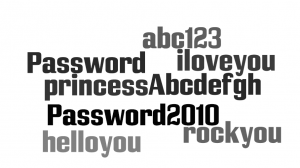 This wordle pic is of the most common passwords used! Not hard to crack really. It’s vitally important that in any e-safety work taking place you remember to highlight the importance of password data.
This wordle pic is of the most common passwords used! Not hard to crack really. It’s vitally important that in any e-safety work taking place you remember to highlight the importance of password data.
Here’s a few pointers to help discussions with children and young people.
- Keep your password like your toothbrush (or your pants) change them often and never share them!
- Not sharing your password with your friend doesn’t mean that you don’t trust that person, it’s for yours and their protection so that if your account was hacked they wouldn’t be under suspicion!
- Increase your password strength, keep your passwords a very random mix of letters (capitals too) and numbers.
- Quite often password hackers can look at profile data and look for words such as pet’s names or siblings / loved ones, these are sometimes the questions websites ask you as security questions! So keep really personal information to yourself and not on your profile.
- Hackers are not only people, there are types of technological robots that access a login and try millions of different variations of popular passwords, again reason to use a password very random and complex.
- People unfortunately do break friends, relationships end. If that sadly happens to you and your boyfriend/girlfriend/spouse does know your passwords be sure to change them immediately.
- I know it’s a pain to remember but don’t use the same password for all your logins, vary them and change often. If someone hacks one account, can they hack into another account too?
- Having a secure password doesn’t mean that your account is completely safe, remember that if you are on shared computers or leave yourself logged in to a public machine, you could leave yourself and your data wide open.
If you have any other suggestions please let us know, have you devised a lesson about this? If so, can we share your plans and evaluations using our GLOW group? This is covered in many of the CEOP resources, but why not create your own? These are the experiences and outcomes this applies to.
Health and Wellbeing – Mental, Emotional, Social and Physical Wellbeing
“I am learning to assess and manage risk, to protect myself and others, and to reduce the potential for harm when possible”.
Technologies
“By considering ways to protect technological devices, I can act safely and responsibly when selecting and using different technologies to communicate and collaborate”.
“I am developing my knowledge and use of safe and acceptable conduct as I use different technologies to interact and share experiences, ideas and information with others”.
NB Wordle is a toy for generating “word clouds” from text that you provide. www.wordle.net
